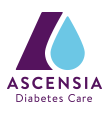STOCKHOLM, April 12, 2024 - Diamyd Medical’s precision medicine Phase 3 trial for Type 1 Diabetes, DIAGNODE-3, has enrolled 100 patients. To date, no serious adverse events have been reported, and no patients have discontinued the trial.
DIAGNODE-3, being the first ever precision medicine Phase 3 trial in type 1 diabetes, is ongoing in eight European countries and in the United States. The trial specifically enrols patients that carry the genetic HLA DR3-DQ2 haplotype, a genetic subgroup of type 1 diabetes that in previous trials has been associated with positive clinical response to Diamyd® treatment. The antigen-specific immunotherapy Diamyd® was in February 2024 granted Fast Track designation by the FDA and has previously been granted Orphan Drug designation in the U.S.
About DIAGNODE-3
The confirmatory Phase III trial DIAGNODE-3 (www.diagnode-3.com), evaluating the safety and efficacy of the antigen-specific immunotherapy Diamyd® in individuals diagnosed with Type 1 Diabetes is ongoing in the United States and in eight European countries: Sweden, Spain, the Czech Republic, the Netherlands, Germany, Poland, Hungary and Estonia.
DIAGNODE-3 will enroll up to 330 individuals aged 12 to 29 years, recently diagnosed (within 6 months) with Type 1 Diabetes, who carry the HLA DR3-DQ2 haplotype, a certain genetic risk factor for Type 1 Diabetes. A further stratification for HLA haplotypes is included in order to evaluate the potential super responder group of individuals who are positive for HLA DR3-DQ2 and negative for HLA DR4-DQ8. HLA testing is well established and widely available.
This patient population is based on clinical efficacy and safety results from the Phase IIa and Phase IIb trials DIAGNODE-1 and DIAGNODE-2, as well as on the large-scale meta-analysis encompassing data from more than 600 individuals from previous Phase II and Phase III trials using Diamyd®. The trial design provides a high probability to reach its co-primary endpoints of preservation of endogenous insulin producing capacity measured as stimulated C-peptide and improved blood glucose control as determined by HbA1c.
DIAGNODE-3 is supported in part by funding from JDRF, the leading global type 1 diabetes research and advocacy organization... Diamyd Medical's Press Release -











